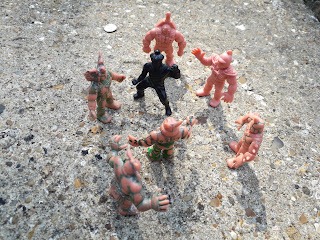Fight, Flight or Negotiate
Read on to find out what happened when I was confronted by a mugger in London in 2006
Paul Carter
4/21/20255 min read


A Friday night in Greenwich, London, 2006. I was going one way; a mugger was going another and then our lives collided.
He started the conversation: “You got the time, mate?”
“Nah, mate, can’t help you.”
“Come on, you must have the time.”
“I don’t have the bloody time, go in the pub and ask.”
“Just give me the time.”
“There’s the bloody time,” I shouted, showing him my £30 watch as my senses battled through my red-wine drunken stupor to finally see what was happening.
“I’ve got a knife and I’m going to stab you,” he said, showing me something in his right hand, but keeping me distracted with his maniacal stare to stop me looking too closely at his weapon as he demanded my cards, cash, phone and watch.
“I’m not going to do that,” I said, behaving like he was trying to push ahead of me in a supermarket queue, when I should have been well ‘ard and thrown this violent thug against the wall. But time just stopped. If this was my test to prove I could handle myself on the street, I wasn’t ready for it.
Railings to the left of me, building site to the right, stuck in the middle with a mugger and I didn’t know what to do. I was going to hit him, kick him, or maybe go for a headbutt. But what if I miss? How do I hit someone? No, definitely a punch.
Hang on, does he have a Welsh accent?
I felt compelled to politely participate as the victim and listen to his sales pitch of “hand over your stuff or die”. Why? Do something, just don’t stand there. Ignore the alcohol and focus. I didn’t fight or run, I chose to negotiate as while I was desperate to avoid being stabbed, I didn’t want the hassle of replacing my debit card and mobile phone.
I stayed calm because I was used to hiding the panic of catastrophic thoughts. My battle with OCD had been a living hell, but it helped me manage my fight and flight emotions to get out of this situation. He was getting more aggressive and I just wanted to end it. “I’ll give you ten quid, but I’m not giving you my card,” I said, putting my debit card in my back pocket and handing him the tenner.
“Give me your phone,” he said.
“No,” I replied.
“Your watch, then,” he said, reminding me he was going to stab me.
I sighed, taking my time in handing over the watch.
He ran off and I legged it into the nearest pub to tell some guys playing pool that I just got mugged. They said I should hide in the toilet, but after escaping one messy situation I didn’t want to enter another. I was in shock but I joined them outside as they walked up and down with pool cues before shrugging their shoulders and advising me to kick the mugger in the balls next time.
Damn it, why didn’t I kick him in the balls?
I had kept my phone. I could have phoned the police within the golden hour of a crime being committed to give the cops a good chance of catching the mugger. But, no, I texted my mates to launch my crisis communications strategy to maintain my non-existent reputation as a tough guy. I texted I should have done this or that and I would be ready next time.
As the adrenaline and shock faded, I realised I was a victim. I was furious, but then I laughed. I had been through far worse than this and survived. Mental ill health couldn’t beat me nor could the shame of being mugged, but such experiences are lived through other people’s eyes and the misconceptions of ourselves.
When I told people I had been mugged, the common responses were, “So, there was only one guy?”, “How big was he?”, “How big was the knife?”, “You should have knocked him out, I would have done.” I felt like a guest on a trash TV confession show as I argued my case to a hostile audience. While people understood what I did, they would have handled it differently. But everyone’s a hero until it happens to them.
Constantly analysing what happened turned the knife into a blunt utensil, infected needle or HB pencil and the more I lost confidence in my handling of the ordeal.
While The Fugitive’s Richard Kimble wanted to find the one-armed man who killed his wife to prove his innocence, I wanted to find the Welsh mugger so he could verify I was a tough negotiator and acted like a man.
As a police press officer, I knew that “have you got the time or a light?” was a precursor to a mugging, but I just didn’t think it would happen to me. I reported it to the police but couldn’t pick out a suspect from the photo album of local criminals. The detective was reassuring and non-judgmental and advised I should stop speculating what would have happened if I had fought the mugger.
The day after the mugging, I ran along the same street to go swimming. And I walked home after every night out. I considered having a fake wallet until I realised that was a trick I remembered from a spies’ handbook for children. I did judo for a year but left with my white belt. Then came boxing and Israeli self-defence Krav Maga classes but I only went a couple of times.
I ran after the next mugger who tried to rob me before coming to my senses and our slanging match at a distance ran out of steam, which was fortunate as my boot had flown off and I had to hop down the street to retrieve it. When I faced another mugger, I sidestepped and shimmied, leaving him bamboozled as I ran down the street with my V for victory sign.
I was fighting my OCD while this was happening. Every day my mind disappeared down rabbit holes, but facing real-life peril put these what-if fears into perspective: they were not real and I did not have to interrogate my mind to prove it. While I wish I never had OCD, it was managing the uncertainty, shame and reputational damage that comes with a mental health condition that gave me the inner strength to deal with the repercussions of being a victim of crime.
I won some playground fights at school, but they were fights I had to win to stay safe. As an adult, I could hardly lead with that when socialising, dating and applying for jobs. My priority was to rebuild my life, not fight muggers.
I’ll never know what would have happened if I had punched the mugger or grabbed his arm to find a straw rather than a knife in his hand. I put it behind me and moved on. As for the mugger, maybe he messed with the “wrong person” or “someone who saw red”. I don’t know or care.
In 2007, I joined British Military Fitness in Greenwich Park, met new people, and discovered a love for distance running. The anger started to fade and the mugging became a character-building chapter of my London years.
But one day I accompanied a female journalist in a police operation who told me her petite sister fought off a mugger. I started thinking, if only I had kicked the mugger…no, no, no, just breathe and let it go.
Life is a battle and negotiation is a powerful weapon.
Inspiration
What we talk about when we are working and living
© 2025. All rights reserved.
